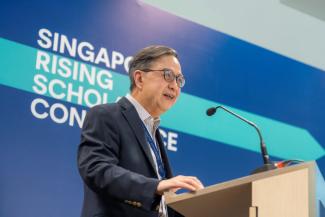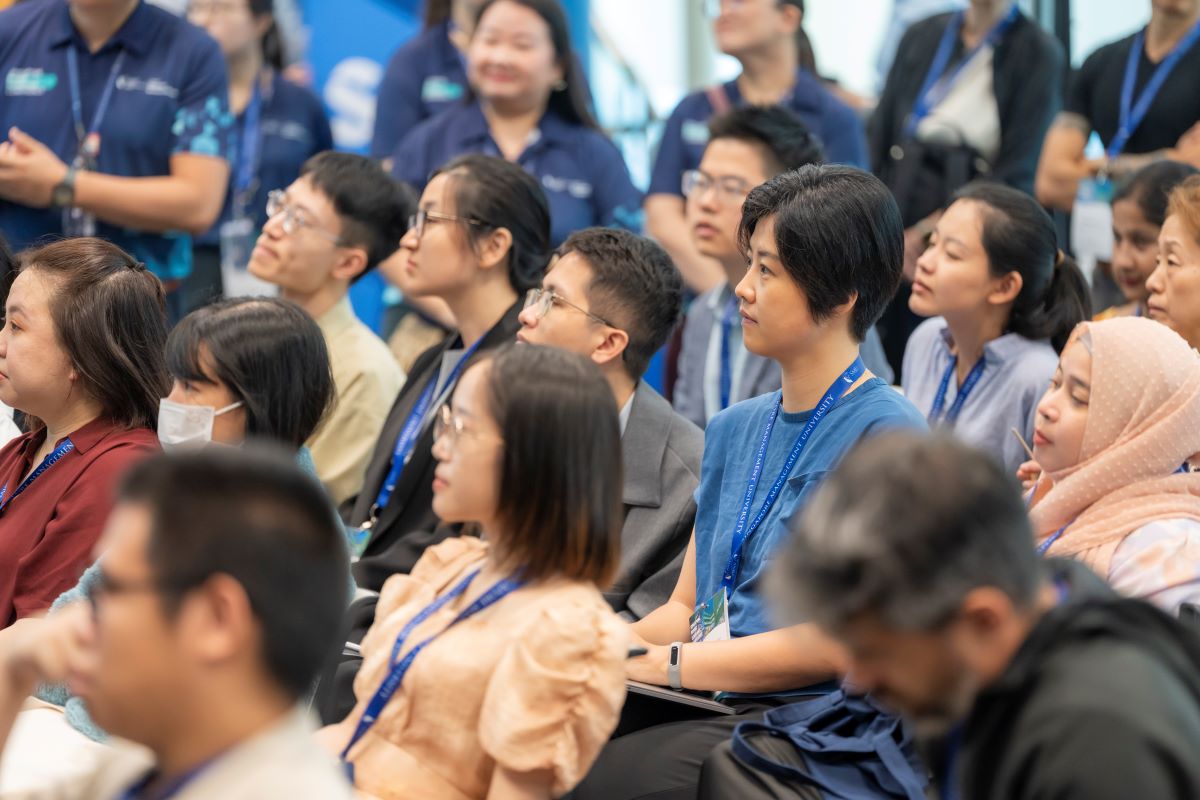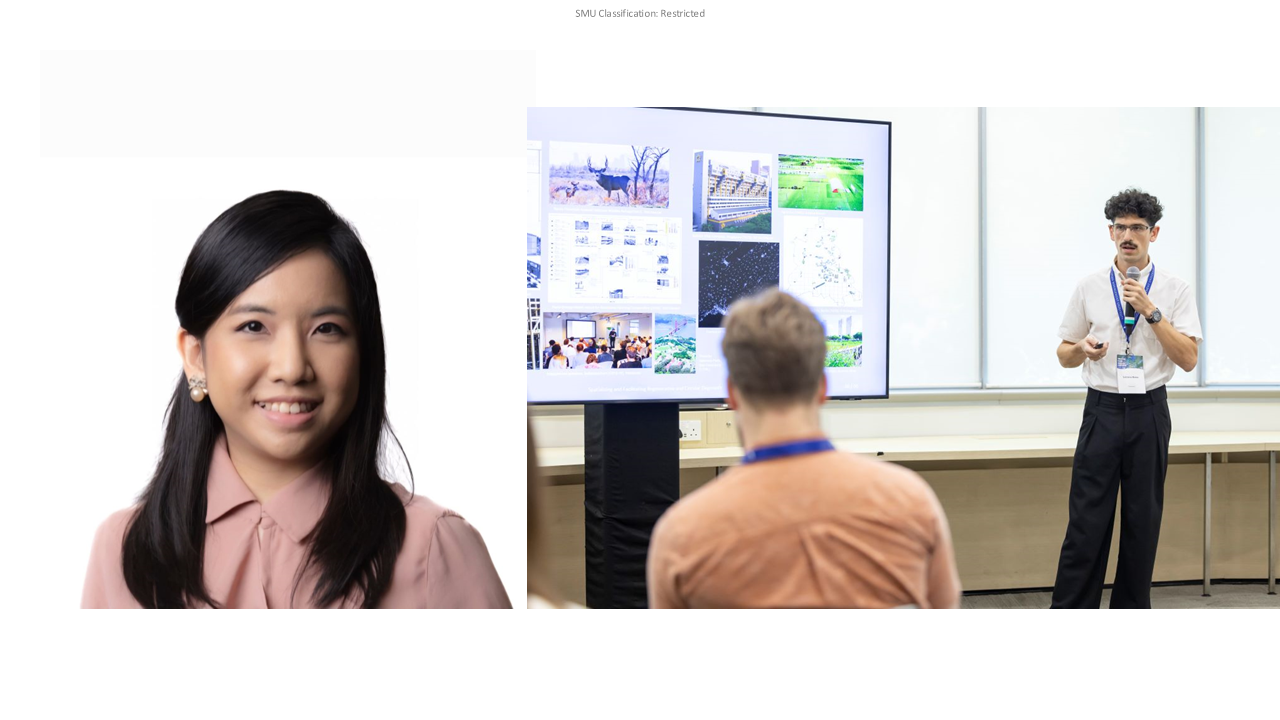
When you embark on a PhD journey at the Singapore Management University (SMU), you are joining us not only as a student but also as a colleague, co-creating knowledge with the rest of the faculty.
This was the key message SMU Provost Professor Alan Chan made during his keynote speech at the annual Singapore Rising Scholars Conference (SRSC). It was organised by SMU’s College of Graduate Research Studies (CGRS), which promotes interdisciplinarity in the University’s postgraduate research programmes.
The conference was held on 15 and 16 May, where doctoral students from various universities around the world presented their work, received feedback and built networks and connections for their academic careers. Known for peer-to-peer networking between doctoral students in the region, the Conference attracted 113 participants, and 60 papers by presenters from 20 institutions globally.

The universities represented this year include Ecole des Ponts ParisTech, Fudan University, Peking University, The University of Hong Kong, Thammasat University, Airlangga University, National University of Singapore, and Singapore University of Technology and Design.
Apart from presenters from fields spanning social science, psychology, corporate governance, information systems, marketing, and management strategy, SMU Librarians also organised seminars on how to write literature reviews, how to conduct text analysis using no-code or light-code tools, and how to raise research visibility by publishing. Furthermore, nine PhD students received the Best Paper Awards at the end of the two-day event.
![Nine PhD students from universities around the world received the Best Paper Awards at the second annual Singapore Rising Scholars Conference. Five are photographed with Dean of the College of Graduate Research Studies, Professor Heli Wang (fourth from left). The recipients are [L-R] Zhao Yue from Singapore Management University, Ying Li from National University of Singapore (NUS), Chitra Pratap from NUS, Gao Huaxi from Peking University, and Luciano Brina from Singapore University of Technology and Design](/sites/news.smu.edu.sg/files/inline-images/Winners%20of%20Best%20Paper%20Award%20with%20Prof%20Heli%20Wang_.jpg)
The Problem of Passive Consumption of Knowledge
Prof Alan Chan noted that the opportunities and challenges posed by Artificial Intelligence (AI) are immense. While AI can contribute significantly to research and education, and students will benefit from and need to master the new digital tools available, the possible adverse effect of over-relying on AI is non-trivial. “The ease with which people can use AI to churn out literature reviews and entire studies should sound an alarm bell,” he said. “AI can hallucinate,” he added. “If we do not use AI tools with critical judgment and discernment, it will only encourage passive consumption of knowledge and erode sound habits and discipline of mind.”
“An important challenge is to design AI tools to expand knowledge and deepen understanding, tools that will enhance critical thinking and communication and not as a substitute for active intellectual engagement,” Prof Chan said. “This will require researchers and scholars in STEM disciplines as well as the social sciences and management to come together to co-create digital tools that will enrich learning, and indeed the human experience.”
Interdisciplinarity from the Ground Up
“To render AI truly serving the interest of humanity,” Prof Chan stressed, “we will need to embrace interdisciplinarity from the ground up, at the very beginning of the design phase, to ensure that important questions about ethics, values and human judgment are integrated into the very design of AI tools.”
He shared his experience at a recent AI conference when discussing the impact of technology on universities.
“As a student of the Humanities, I was heartened by the interest STEM researchers had shown, seeking my views on ethics and culture, as they were equally concerned about the questions of how identity, culture and tradition impact the design of technology,” he recalled.
Stressing further the importance of interdisciplinarity in research, he said, “Interdisciplinarity works best when like-minded individuals come together with similar concerns addressing large, complex issues. And that is the kind of PhD experience that we want to encourage.”
An Immersive Springboard for Scholars
For the first time, CGRS also welcomed participants on the Rising Scholars Fellowship Programme (RSFP), eligible master's and bachelor's students an immersive programme by participating in the SRSC. They get to attend presentation sessions by doctoral students and explore new research ideas.
Said Dean CGRS, Prof Heli Wang: “What differentiates RSFP from other outreach programmes is the fact that it is immersive and personalised. It is not just an info session but an experience. Each fellow follows a discipline-specific track, interacts directly with faculty, and experiences our research culture up close.”
“We believe that the fellowship programme will become a key part of SMU's strategy to build a vibrant and diverse PhD community,” she added. “And inspire greater interest in academic careers and deepen regional engagement among our graduate education faculty and researchers.”
Learning from Peers is a Plus
A PhD student who has attended the Conference annually is Sompassorn Ruksomboonde, a Thai PhD student in Finance at SMU’s Lee Kong Chian School of Business. “It was a great chance to meet PhD students from well-known universities around Asia,” she said. “We get to exchange research ideas, which improves my perspective and widens my connections.”
She presented her research at the Conference, and it focused on how the nationalities of the top management team are associated with lower carbon emissions. Such management leaders from countries with more stringent and advanced environmental standards bring fresh perspectives to environmental corporate governance.

Luciano Brina, an Argentinian PhD student at the Singapore University of Technology and Design, was another recipient of the Best Paper Award. As an urban planner, his paper focused on degrowth and right-sizing architectural strategies for tackling urban shrinkage.
“The wealth of questions I received during and after my presentation was something rare yet extremely valuable in my academic journey,” he shared. “The Fort Canning-SMU area, as well as the Li Ka Shing Library, are amongst my favourite places in Singapore, so count me in for the SRSC 2026!”